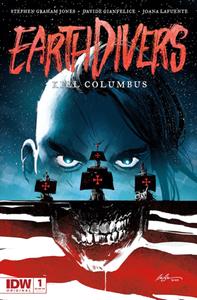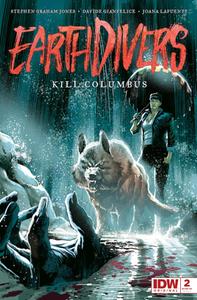
|
|
| Stephen Graham Jones | |
Stephen Graham Jones is the New York Times bestselling author of nearly 30 novels, collections, novellas and comic books. Most recent are My Heart is a Chainsaw and The Babysitter Lives. Jones spoke with Shelf about his new comic book series, Earthdivers, and what it has been like to move from novel to comic storytelling.
By the second page of the first Earthdivers, the premise is clear: a character is going back in time to kill Christopher Columbus. Would you tell readers a little bit about this graphic novel series?
What American Indian doesn't want to go back, keep us from getting "discovered," called the wrong name, then infected and enslaved and massacred over and over? Columbus wasn't around for the long history of bad relations and worse people, but there is the sense that--like Custer and the Black Hills--he's the one who kicked the door open. The dream is to go back, do away with him, but wouldn't it also be great to get to go back and show him that it didn't work? That, despite all the concentrated efforts, we're still here and creating comic books? That'd be great to throw in his face. And then get to the rest of the... mission.
 Have you always wanted to write graphic novels?
Have you always wanted to write graphic novels?
Yeah, comic books have been where it's at for me since I was 12 years old and stumbled upon Secret Wars #4 in a rural gas station. I love the form, the grammar and syntax of pages and panels and how much you can do with and in a comic book. If when I was starting out I had an inroad to comic booking, I wonder if I ever would have written prose fiction. I love prose fiction--I live in those rhythms, those possibilities. But if I'd taken a sidestep into comic books and had some luck there? I honestly don't know. I'm fortunate to be getting to do both, now. I love prose fiction and I love comic books. I also love music, but no worries--complete lack of talent's going to keep me from playing in that field.
How was it switching to writing graphic novels? Do you prefer writing one over the other?
It's harder because, for each issue, there's a finite number of pages, and of course you have to stage things on page-turns, and then set up and get out of two-page spreads... It's fantastically fun, but it means I have to plan--I have to figure out beforehand what's going to fit, where it's going to turn and how it's going to end. That's completely opposite to the way I write. Juggling captions and dialogue, tiers and panels, that comes naturally. I've been living in the comic book page so long that it's second nature, moving like that. It's about 14th nature having to outline, though. Maybe 22nd, even.
The illustrations are fabulous. What was your experience with the art?
Davide's character sketches completely changed the development and direction of the comic book before we even got it going. So, from the get-go, his art has been vital. But what's amazing is working with someone with a visual sense, an ability to make layouts dynamic, an instinct for expression with nothing but lines. My favorite parts of this process have been when his art erases some of my words. Then I can scrub them from the script because they're, in the sense that matters, already there. It's been a magical process.
 What is the publication schedule for this series? Is it following a comics model or a traditional publishing model?
What is the publication schedule for this series? Is it following a comics model or a traditional publishing model?
Comics model: monthly, arc by arc. Which is another thing I'm having to learn: how to arc a character episodically, rather than giving them this long on-ramp to change and discovery. Serial storytelling is completely different. It's both liberating and confining, but in good ways. It's making me grow as a writer, and that's been a wonderful and surprising gift.
Is there anything else you'd like to tell Shelf readers?
I actually did research for this story. And I usually research nothing. I figure if I can't convince the reader of this lie, then I'm not writing well enough. I'd much rather make a fact up than find one that corresponds to the world. But, due to the historical nature of this, I had to choreograph with the actual first voyage in 1492. It was revealing how much of it is still guesswork--we're not even completely sure what language Columbus spoke. But, for that language? One of my sisters has a graduate degree in linguistics. I was able to call her up every time I hit that language wall, and needed some insight that... I probably should have researched myself. But research is so not-fun. This kind of research, though? I get to talk to my sister. That's the kind of research I like.

